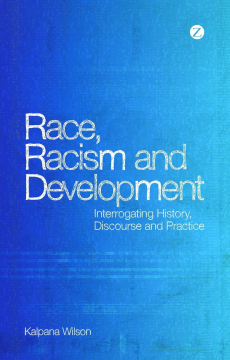
Additional Information
Book Details
Abstract
Race, Racism and Development places racism and constructions of race at the centre of an exploration of the dominant discourses, structures and practices of development. Combining insights from postcolonial and race critical theory with a political economy framework, it puts forward provocative theoretical analyses of the relationships between development, race, capital, embodiment and resistance in historical and contemporary contexts. Exposing how race is central to development policies and practices relating to human rights, security, good governance, HIV/AIDS, population control, NGOs, visual representations and the role of diasporas in development, the book raises compelling questions about contemporary imperialism and the possibilities for transnational political solidarity.
Kalpana Wilson is a Fellow at the Gender Institute, London School of Economics.
'This important book breaks the silence on race and racism in development. Kalpana Wilson's nuanced historical and political analysis goes beyond a narrow critique of the development industry to address broader questions of injustice, making this a book that ought to be essential reading for all students and practitioners of development.'
Andrea Cornwall, Professor of Anthropology and International Development, University of Sussex
'Race, Racism and Development makes several key interventions that bridge postcolonial, political economic, critical race, and feminist literatures. Wilson's critiques of Foucauldian approaches to power and development are a breath of fresh air ... [her] careful attention to the histories and dynamics of domination and resistance around the globe and their significance for contemporary politics is compelling ...The author rightly asks us to think more deeply about what a productive politics of transnational solidarity would look like. This book marks a major moment in the project to break the silence around race and racism in development studies.'
David Naguib Pellow, Professor of Sociology, University of Minnesota, author of Resisting Global Toxics: Transnational Movements for Environmental Justice
'Kalpana Wilson's new book is a clear indictment of the imbrication of race in development, a fact well-known to race critical scholars, but one which has rarely been analysed in such historical and contemporary sociological depth. This accessibly written and cogently argued book is a must-read for students of race and development alike'.
Alana Lentin, co-author of The Crises of Multiculturalism
Table of Contents
| Section Title | Page | Action | Price |
|---|---|---|---|
| Cover | Front cover | ||
| About the author | ii | ||
| Title | iii | ||
| Copyright | iv | ||
| Contents | v | ||
| Acknowledgements | vii | ||
| Introduction | 1 | ||
| Theorising race and development | 5 | ||
| 1 Race, capital and resistance through the lens of 1857 | 16 | ||
| ‘Race’, capital and freedom | 19 | ||
| Remembering 1857 | 24 | ||
| The remaking of 1857 as a ‘clash of rival fundamentalisms’ | 26 | ||
| Reinventing India after 1857 | 35 | ||
| Social Darwinism and the racialisation of difference in India | 41 | ||
| 2 The gift of agency: gender and race in development representations | 45 | ||
| Race, gender, development | 46 | ||
| Neoliberalism and women’s agency | 47 | ||
| Thinking about representation in development | 52 | ||
| NGOs and changing representations | 55 | ||
| ‘Add to basket’: exoticising the deserving poor | 57 | ||
| ‘Invest in a girl’ | 61 | ||
| ‘Race’, gender and guilt | 65 | ||
| Conclusion | 67 | ||
| 3 Population control, the Cold War and racialising reproduction | 69 | ||
| Malthus, population and poverty | 71 | ||
| Malthus, ‘race’ and colonialism | 72 | ||
| Racism, ‘science’ and birth control | 76 | ||
| The Cold War and population control | 82 | ||
| Population control as racialised violence | 90 | ||
| Conclusion | 96 | ||
| 4 Pathologising racialised sexualities in the HIV/AIDS pandemic | 97 | ||
| ‘Race’ and neoliberalism in the structure of the AIDS pandemic | 98 | ||
| ‘Race’ in the representation of HIV/AIDS | 105 | ||
| Racialised masculinities and heteronormativity in representations of HIV in Africa | 110 | ||
| The response to HIV/AIDS: race, capital and ARVs | 115 | ||
| 5 New uses of ‘race’ in the 1990s: humanitarian intervention, good governance and democracy | 123 | ||
| Towards ‘rights-based’ humanitarianism | 127 | ||
| Good governance and the racialisation of corruption | 136 | ||
| Appropriating democracy | 148 | ||
| 6 Imperialism, accumulation and racialised embodiment | 153 | ||
| Development as biopower | 154 | ||
| Space and race | 163 | ||
| Race, development and embodiment | 165 | ||
| Embodiment, land and development | 177 | ||
| 7 Worlds beyond the political? Postdevelopment and race | 183 | ||
| Post-development and race | 184 | ||
| Protecting the authentic native in Niyamgiri | 187 | ||
| NGOs and aliens in the London anti-Vedanta protests | 191 | ||
| Post-development policing | 198 | ||
| 8 Reconfiguring ‘Britishness’: diasporas, DfID and neoliberalism | 206 | ||
| Postcolonial critiques of racism in development | 207 | ||
| Multiculturalism and development | 214 | ||
| In lieu of a conclusion … | 242 | ||
| Notes | 244 | ||
| References | 256 | ||
| Index | 279 | ||
| About Zed Books | 286 |
